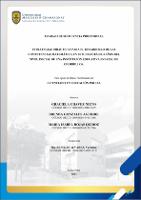Estrategias didácticas para el desarrollo de las competencias matemática en estudiantes de 4 años del nivel inicial de una institución educativa estatal de Chorrillos

Fecha
2023Autor(es)
Chavez Nieto, Graciela
Gonzales Aguirre, Brenda
Rojas Quiroz, María Isabel
Metadatos
Mostrar el registro completo del ítemResumen
El presente trabajo de suficiencia profesional que se presenta a continuación, tiene como
objetivo diseñar estrategias didácticas para el desarrollo de las competencias matemáticas
en los estudiantes de 4 años de una institución educativa estatal de Chorrillos, tomando
como base el Paradigma Sociocognitivo Humanista con exponentes como Jean Piaget,
David, Ausubel y Jerome Bruner, Lev Vygotsky y Reaven Feuerstein, Robert Sternberg,
Martiniano Román y Eloísa Diez. Además, en este paradigma encontramos los actitudes
y valores que cada estudiante debe incorporar en su trabajo individual y grupal.
Esta propuesta busca involucrar a los estudiantes en su proceso de aprendizaje,
desarrollar sus competencias matemáticas y fomentar la resolución de problemas como
enfoque que sustenta el área de matemática.
Esta propuesta cuenta con tres capítulos: El primer capítulo incluye el diagnóstico de la
institución educativa, los objetivos y la justificación, el segundo capítulo continente el
marco teórico y tercer capítulo contiene la programación curricular, que abarca desde la
programación anual, hasta las sesiones de aprendizaje, incluyendo fichas, evaluaciones
y un proyecto de aprendizaje desarrollado. The present work of professional sufficiency that is presented below, has the objective of
designing didactic strategies for the development of mathematical skills in 4-year-old students of
a state educational institution in Chorrillos, based on the Humanist Sociocognitive Paradigm with
exponents such as Jean Piaget, David, Ausubel and Jerome Bruner, Lev Vygotsky and Reaven
Feuerstein, Robert Sternberg, Martiniano Román and Eloísa Diez. In addition, in this paradigm
we find the attitudes and values that each student must incorporate in their individual and group
work.
This proposal seeks to involve students in their learning process, develop their mathematical
skills and encourage problem solving as an approach that supports the area of mathematics.
This proposal has three chapters: The first chapter includes the diagnosis of the educational
institution, the objectives and justification, the second chapter the theoretical framework and the
third chapter contains the curricular programming, which ranges from the annual programming
to the learning sessions. , including worksheets, evaluations and a developed learning project.
Colecciones
- Educación Inicial [144]

